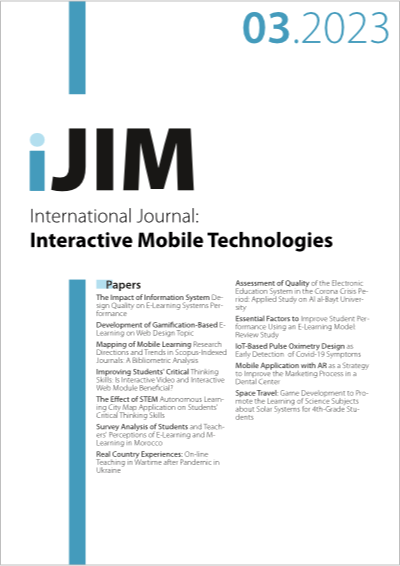Space Travel: Game Development to Promote the Learning of Science Subjects about Solar Systems for 4th-Grade Students
DOI:
https://doi.org/10.3991/ijim.v17i03.36469Keywords:
4th grade students, education game, solar systemAbstract
The objectives of this research are to develop a game to promote the learning of the solar system in science subjects of 4th grade students, to compare the academic results of pre- and posttest of students after learning with the space travel game and to determine the satisfaction level of students with the space travel game. The sample group used in the experiment was 4th grade students from school T, and classes were randomized using the stratified random sampling method. Students were categorized into 2 groups: those with average scores and those with high scores in science subjects. The final results were compared between the control group, 27 students learning normally using the conventional method, and the experimental group, 27 students learning using the space travel game. There were 52 students in total. The tools used in this experiment are a space travel game, an achievement assessment test, a pre- and posttest, and a questionnaire to determine the satisfaction level of students. The statistical tools used are the mean, percentage, and standard deviation, paired t test, and t test independent. The results of this experiment showed that the experimental group learning from the game obtained a higher score than that of the control group by 1.19, on average. The scores of both groups were shown to have statistically significant differences at a 95% confidence level.
Downloads
Published
How to Cite
Issue
Section
License
Copyright (c) 2023 Thanakorn Uiphanit, Pattarasinee Bhattarakosol, Thatsanan Chutosri , Pongpisid Liangyoo , Pongsakorn Kingsuwankul , Natcha Wattanaprapa, Wannarat Bunchongkien , Phachaya Chiewchan, satien Janpla

This work is licensed under a Creative Commons Attribution 4.0 International License.


